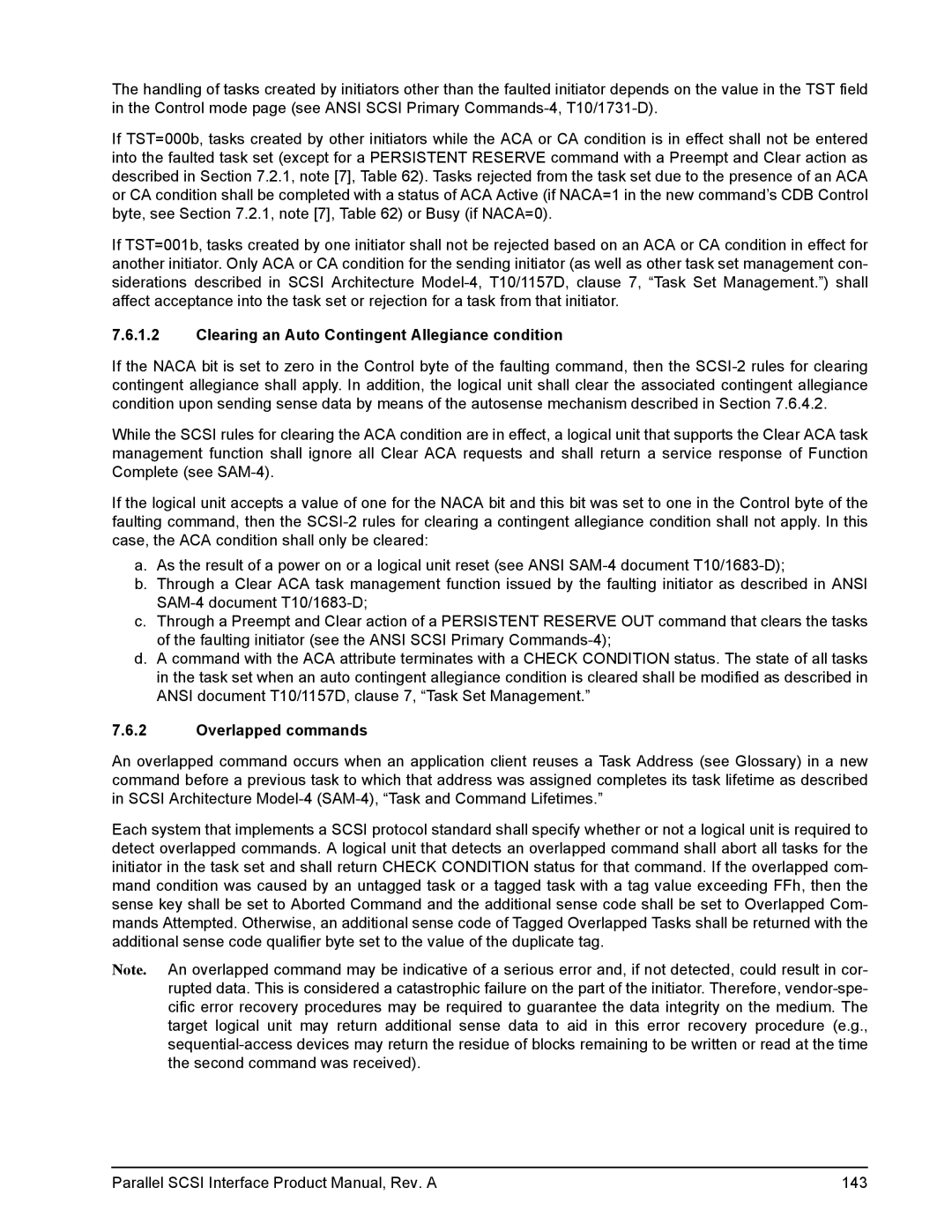The handling of tasks created by initiators other than the faulted initiator depends on the value in the TST field in the Control mode page (see ANSI SCSI Primary
If TST=000b, tasks created by other initiators while the ACA or CA condition is in effect shall not be entered into the faulted task set (except for a PERSISTENT RESERVE command with a Preempt and Clear action as described in Section 7.2.1, note [7], Table 62). Tasks rejected from the task set due to the presence of an ACA or CA condition shall be completed with a status of ACA Active (if NACA=1 in the new command’s CDB Control byte, see Section 7.2.1, note [7], Table 62) or Busy (if NACA=0).
If TST=001b, tasks created by one initiator shall not be rejected based on an ACA or CA condition in effect for another initiator. Only ACA or CA condition for the sending initiator (as well as other task set management con- siderations described in SCSI Architecture
7.6.1.2Clearing an Auto Contingent Allegiance condition
If the NACA bit is set to zero in the Control byte of the faulting command, then the
While the SCSI rules for clearing the ACA condition are in effect, a logical unit that supports the Clear ACA task management function shall ignore all Clear ACA requests and shall return a service response of Function Complete (see
If the logical unit accepts a value of one for the NACA bit and this bit was set to one in the Control byte of the faulting command, then the
a.As the result of a power on or a logical unit reset (see ANSI
b.Through a Clear ACA task management function issued by the faulting initiator as described in ANSI
c.Through a Preempt and Clear action of a PERSISTENT RESERVE OUT command that clears the tasks of the faulting initiator (see the ANSI SCSI Primary
d.A command with the ACA attribute terminates with a CHECK CONDITION status. The state of all tasks in the task set when an auto contingent allegiance condition is cleared shall be modified as described in ANSI document T10/1157D, clause 7, “Task Set Management.”
7.6.2Overlapped commands
An overlapped command occurs when an application client reuses a Task Address (see Glossary) in a new command before a previous task to which that address was assigned completes its task lifetime as described in SCSI Architecture
Each system that implements a SCSI protocol standard shall specify whether or not a logical unit is required to detect overlapped commands. A logical unit that detects an overlapped command shall abort all tasks for the initiator in the task set and shall return CHECK CONDITION status for that command. If the overlapped com- mand condition was caused by an untagged task or a tagged task with a tag value exceeding FFh, then the sense key shall be set to Aborted Command and the additional sense code shall be set to Overlapped Com- mands Attempted. Otherwise, an additional sense code of Tagged Overlapped Tasks shall be returned with the additional sense code qualifier byte set to the value of the duplicate tag.
Note. An overlapped command may be indicative of a serious error and, if not detected, could result in cor- rupted data. This is considered a catastrophic failure on the part of the initiator. Therefore,
Parallel SCSI Interface Product Manual, Rev. A | 143 |
